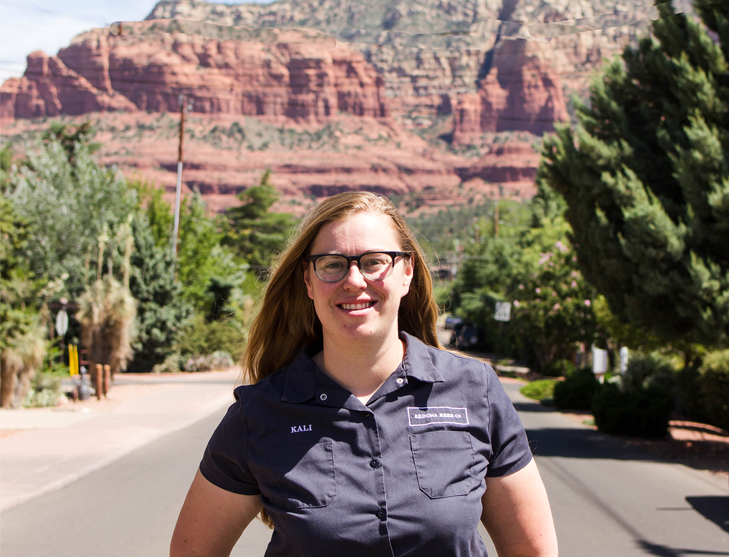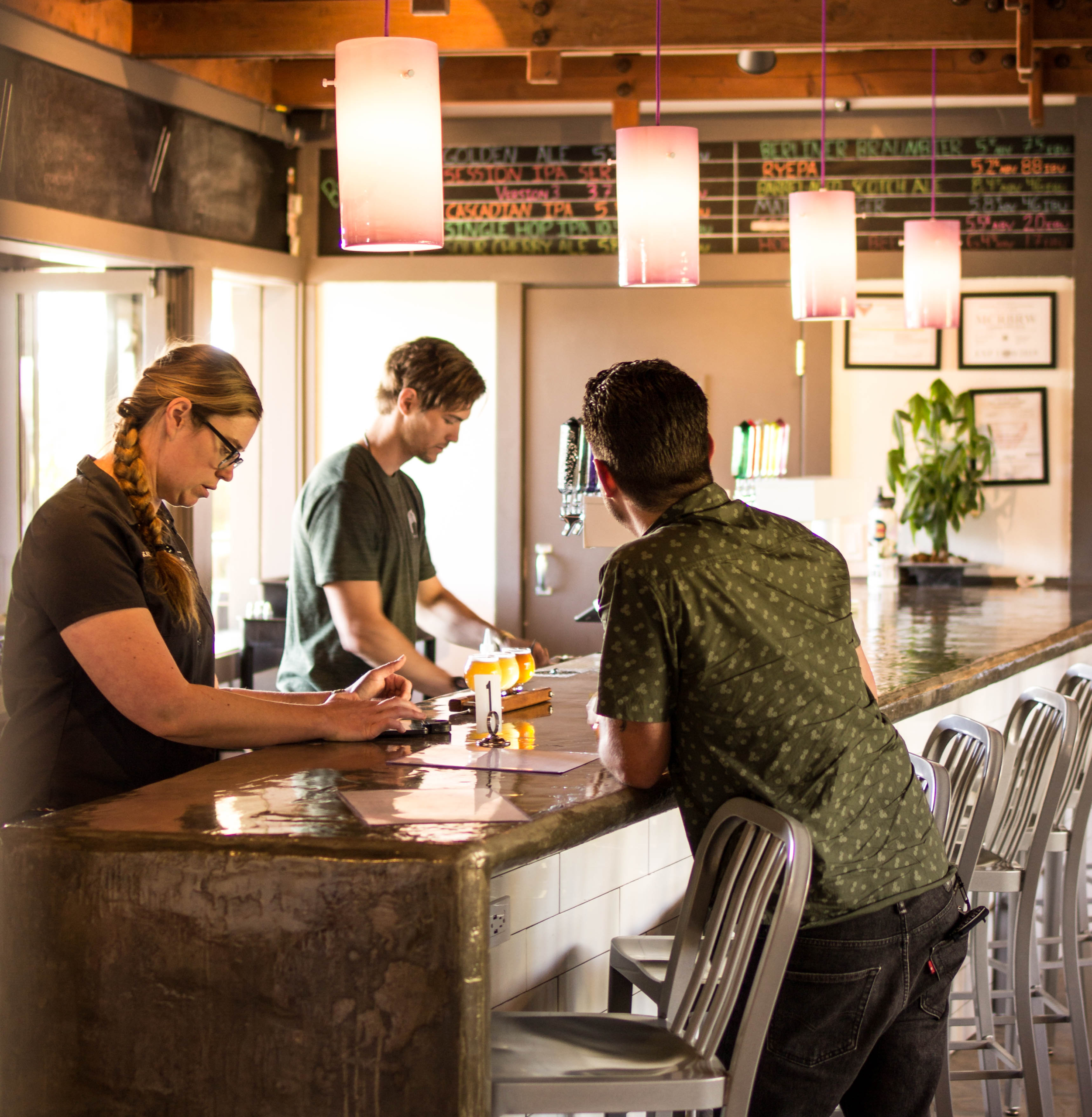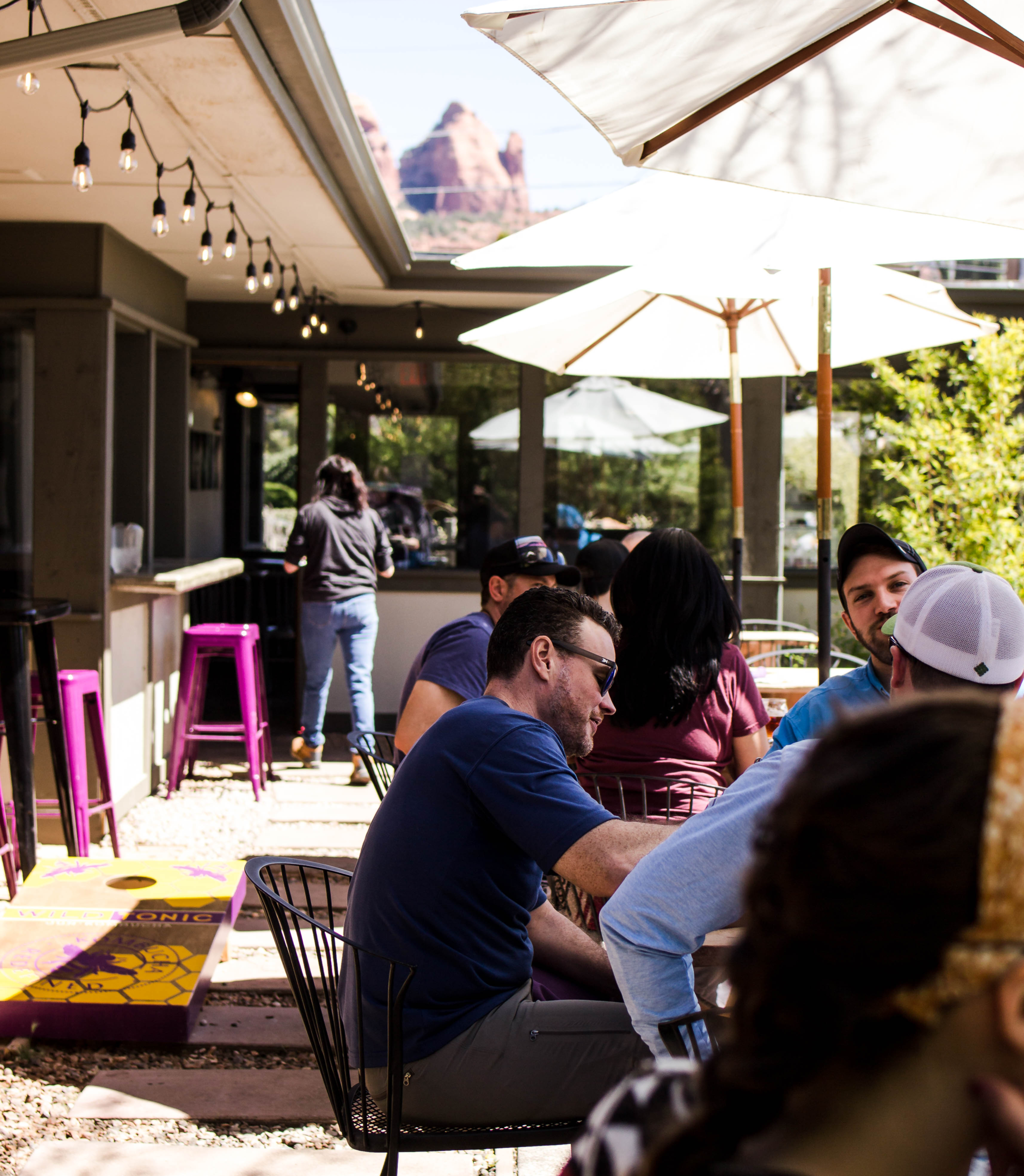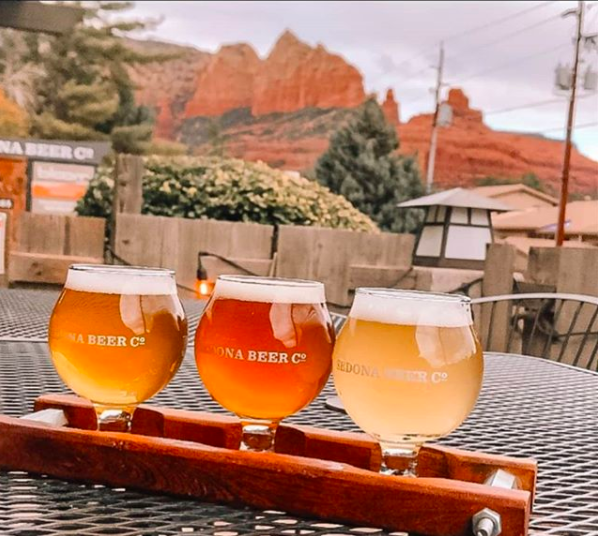Kali Gajewski from Sedona Beer Co.
Meet Kali Gajewski, co-owner of Sedona Beer Company, a local craft beer spot and ‘zen’ restaurant in Sedona, Arizona. Kali charmed us with her origin story over video chat from her sunny, spacious taproom. Behind her, a long bar, two outdoor patios, and stunning views out the large windows. The taproom offers gorgeous panoramas of …

Meet Kali Gajewski, co-owner of Sedona Beer Company, a local craft beer spot and ‘zen’ restaurant in Sedona, Arizona. Kali charmed us with her origin story over video chat from her sunny, spacious taproom. Behind her, a long bar, two outdoor patios, and stunning views out the large windows. The taproom offers gorgeous panoramas of the red-rock buttes and a wisteria-filled courtyard housing the biggest Aleppo tree in Sedona.
After moving back to the tourist town where she was raised with her brewer husband, Mac, Kali built the brewery she wanted to hang out in. Sedona Beer Co. offers sustainable beers while providing an oasis for locals and visitors alike (including a blind owl named Moonlight).
Nancy Trigg, Arryved President and CGO, chatted with Kali, learning about how she made this place her home.
Nancy Trigg: Tell us about you. How did you get started and find yourself in this industry?
Kali Gajewski: We’re a small boutique brewery in Sedona, Arizona. It is a tourist community. We have about 10,000 full-time residents and we get about 4 million tourists a year. It’s a beautiful beautiful place. I’m born and raised in Sedona. I did my bachelor’s at CU Boulder and then my master’s at the University of Denver. My husband, Mac, who I met in undergrad, did a bachelor’s and a master’s at CU Boulder, so we were in the Boulder/Denver area for about a decade. He has a masters in civil engineering, I have a masters in social work. We were living in Jefferson Park in Denver and had a great little house, a dog, great jobs. All of a sudden we had an opportunity to move back to Sedona. We had done everything right in life, as we were told, with our degrees, our jobs, our house, and our dog, and we wanted to try to do something for ourselves.
Mac had been a homebrewer since probably before his 21st birthday. He started brewing beer and hard cider for me because I didn’t like beer, which is adorable in hindsight. Sometimes you have to grow into it. It’s an age old story of the engineer turned brewer. They just have that very structured but desire for creativity that fits really well with brewing. We made the decision to take his hobby potentially to a new career and I really liked the idea of building community in my hometown. I didn’t feel like Sedona had a place like I had experienced in Boulder and Denver, that of the beer community, that feeling that you get in your brewery. So we moved back in October of 2015 and we opened our doors at Sedona Beer Co. in August of 2018. We got here, we opened, and it worked. I joked with people that I opened the place I wanted to hang out at and now I don’t get to leave. It’s been incredible. The community support has been unbelievable, the visitor support has been unbelievable, plus Mac has been cranking out some really amazing beers. We’re really thrilled to be part of the community and getting Sedona a better, more beer focused experience that they didn’t have before.
 Image courtesy of Sedona Beer Co.
Image courtesy of Sedona Beer Co.
N: Can you talk a little bit about what you have done well? What are the things that you really feel like have worked for you to get you to where you are in your success?
K: Focus on community is definitely part of it. If you’ve been to any tourist town, you know there’s a hunk of town that is the tourist part that locals don’t go to. In Sedona, it’s called Uptown Sedona, and we found a place a few blocks into the neighborhood from Uptown. I opened with making sure the neighborhood knew they could come here and it wasn’t a tourist trap. I wasn’t going to charge them $10 a pint. All of those things really worked. Honestly, that’s who is sustaining me right now, the community of neighbors I built over the last 2 years coming in every week for growler fills. I’m their social interaction for the day. I think we did that very well.
Another thing we put focus on very early is a sustainability culture. It was really important to us, regardless of expectations, to build a sustainable business. That means we buy all local barley for a base malt that comes from about 20 miles Southwest of us called Sinagua Malt. They are a malt company that was created by The Nature Conservancy to support declining river flows. It’s worth it to us to one, support them because what they’re doing is really important and two, the fact that we can have local barley in our beer. They base all our beers and then we have one lager that’s 100% Sinagua. We’re really fortunate. It is important to us to support them, to support river conservation, but also to have the freshest barley possible. I mean, we’ll get barley two days after it’s been malted. That’s not a thing that happens very often and it’s really cool. The culture of sustainability runs through everything.
N: What is it about your team that you like? What makes you excited and proud to work with the group of people that you do?
K: I’m happy to talk about that because I miss them. I’m here alone a lot. The people who work here are really dedicated and passionate people. They helped me grow the business. The ones that have been here the whole time learned how to use Arryved with me. They know basically as much as I do because we all did it together. When a regular walks in, they know their name. They care deeply about each other, the business and our community. And it’s only gotten better. I’m really grateful!
N: I want to know a little bit about your service model. What’s the service experience like for your guests? What are things to you focus on?
K: That was actually a really hard start off for us because counter service isn’t normal here. We opened with a counter-service model and man did we get kickback for it real hard for a while. People are used to table service and because I served food they expected table service. I stuck to my guns, I made it clear that this model is because we’re a brewery and we don’t want you to just eat and get out. If you want to drink beer at your table and play Jenga, cool, I’m not going to kick you off of your table. Over the course of the last few years people have embraced [counter service] which has been really nice. When you walk in the front door our bartenders will look up and will greet you as you walk into the space like, ”Hey! Welcome! Menus are right here. Order at the bar whenever you’re ready.”
 Image courtesy of Sedona Beer Co.
Image courtesy of Sedona Beer Co.
N: What is happening right now? Are you completely closed?
K: We’re doing beer to-go. We closed our kitchen about 2 weeks after the stay-at-home order because the kitchen is expensive and the volume was down. At the same time I furloughed all of my employees because they make more money on unemployment than I could pay them. This is now the end of busy season but it was the middle of busy season for us. All the beer was made when we were closed down for our stay at home order, we were about as full as we ever get with beer. We figured Mac and I would just keep the place open and do beer to-go; it was already on hand, it really didn’t cost us anything. We’re down about 92 to 98% on any given day for what this time of year should be. We’re not alone in that.
N: What are you doing already or right now to prepare for what comes next?
K: We’re trying to get some booths built in the space because we think they’ll be a better option than tables so people can’t move around. We’re going to end up re-working our whole Taproom due to this; a complete reset within reason. We know more now than we did before we opened so we might as well take the time we have and fix some things that were not working. We [also] know that the standards and people are going to behave differently in our space than they ever have before. Trying to make it not as crammed and feel like they can have some space is kind of the goal at this point.
N: Anything that you’ve learned during this time about your business and your operations that you think is going to actually be of benefit far beyond the pandemic period?
K: When you’re immersed in running your business everyday, it’s really hard to take the whole picture and look at what’s going on until you have the time. We didn’t really have the time before. The shutdown allowed us to take three steps back and ask, where are we? Where are we going? What’s a good idea? What should we be doing?
I’m coming back with a whole new mindset for my staff and a much better focus on the future. I think that this ‘forced reset,’ will have its benefits pending my market still exists. For the past few years the best way to make money in beer is direct-to-consumer Brewpub-y ways. Arizona doesn’t really have a taproom culture yet. Now, I don’t know if that’s the winning model; that’s literally how we built our business so we’re going to see what happens when we reopen.
N: Do you think you are going to have to shift in terms of the order situation once you re-open? What are your thoughts on that?
K: I’m really hoping that I can get engagement with the [Arryved mobile] app. I would love to push most of my consumers to order with the app. I don’t know specifically with my crowd if the app is going to be a successful push. I just don’t have the most techie of consumers and especially people who are visiting, I think it is going to be a hard sell for an app for a single thing. However, I’m still going to give it a solid try to encourage people to order from the app.
Other than that, we have another ordering station from the patio. If I can’t get engagement in the app, this room that I’m sitting in right now, the entryway room, is really going to be close to empty for social distancing. We’re going to lose 12 seats plus the bar to make it so I can have a line that is socially distanced; sending the line towards the front door with circles on the ground. That is my plan. Will it work? I don’t know. I don’t know much right now and that is ok.
N: No one does.
K: The one thing we talked about is because we never had a traditional service model in the eyes of Sedona-land, I can kind of do whatever I want. My brewery was already a weird place. It is fine if it gets weirder. It was already the young place so it is fine to push app ordering. I have a lot of freedom and flexibility for that.
 Image courtesy of Sedona Beer Co.
Image courtesy of Sedona Beer Co.
N: I want to talk about Marketing next. Can you talk about what you have done that has worked? Any channels that you use for outreach? Or special activities you do to drive traffic?
My main source of outreach is Instagram. We did a lot of partnerships with other people in town. We had a ‘Drink and Draw’ one Friday a month, we do beer specials every Monday, things like that. I didn’t have to do a lot to drive traffic because we got so busy so fast that all the things I would have built to drive traffic got pushed to the side.
I think making people feel like they are part of our community really helped drive traffic. Creating a place where people want to come back at least while they are visiting, here, that was kind of how we kept our flow. We’d see that pretty often with visitors. We’d see them once and then maybe a couple of days later see them again. I am really fortunate to have very talented bar staff that would remember them. I have one bartender that if [a visitor] would sit at the bar the first time they were there, he would remember their name which is pretty incredible. People are really attracted to that community factor that we can give them.
N: Are there any other community type partnerships that you’ve done?
K: We do partnerships with a wildlife center in town [The Runnin’ W Wildlife Center]. They actually released a wild owl they rehabilitated from our patio last year. It was found somewhere in the neighborhood so we were a close place to let it go anyway. They also have a blind owl that’s permanently rescued so they’ll bring the blind owl–his name is Moonlight, he’s been on both of our patios, he comes in a cat carrier, it is adorable–and we’ll do education and fundraising for them.
We also have a blossoming relationship with the Red Rock Trail Fund, which is a group of people who build and maintain our trails. They are mountain bike focused. We participated in a mountain bike fest this March. Thank goodness that thing happened because it was a crazy crazy weekend (and you know we had a lot of beer ready for it) but I think a week later and it probably wouldn’t have happened. During the month of March, a dollar from the purchase of every pint went to the Red Rocks Trail Fund. They came and did an event here to kick it off. Those are the types of things I tend to be the hub for whatever is happening.
 Image courtesy of Sedona Beer Co.
Image courtesy of Sedona Beer Co.
N: I want you to tell us what you think people should know about you guys. About what you’re doing that is great and sets you apart.
K: I want to come back to that sustainability, hyper-local focus we got going on. Craft beer is turning to terroir (environmental factors that affect a crop’s specific growth habitat) that wine has done for a long time but maybe has been either not noticed or not appreciated in beer. We want to create beer for when you’re right here, in the taproom with the views, the beer and the rotating taps and menu. You can go and drink beer when you’re elsewhere but when you’re here, we want to make the beer that is best for you, right now, in this moment, with local ingredients and sustainable methods that really speak to us. We’re one of the highest rated restaurants in town on accident, which is pretty cool. That was not the intention in opening a brewery but we’re very grateful for the quality of our food and that will continue and only become more sustainable and local as we can see better control of our supply chains. We have 12 taps that are usually running and of those 12, not many stick around. We make a batch of beer you enjoy for that batch and when it’s done, something new comes out. We don’t necessarily have flagship [beers], we want the beer to reflect the season and give people a new experience every time they come in. That’s why we’re special, that’s why we’re worth visiting. To be in this beautiful place and drink something that came from it and with barley that supports the rivers that supports communities. And it’s my home. It’s important to me that this place is taken care of. That the community is taken care of and that we continue to grow as a sustainable tourism place.
N: Anything else you want to add…
K: I’m really fortunate that we had you guys with us since the beginning. Choosing a point-of-sale blindly is hard. Especially not being from an industry with any…you know, I’m a social worker! I don’t hide that I’m not from this industry, I’m not. I haven’t worked in restaurants my whole life. The benefit I have is that I’ve worked with people my whole life and that is still what this is.
N: Kali, one thing I remember about our first meeting, and it’s funny how it feels like the thread running through your entire business, is that you said part of your decision was that you really believe in supporting small-business. That you wanted to work with people that you thought you knew. Two years later this is still running throughout everything you do.
K: Absolutely. And to watch you guys grow has been a pleasure. I think there was somewhere between 50 and 80 breweries on board when we said yes. We went on our first real vacation last week of January, it was amazing and bizarre, and we ran into Billy [Arryved Customer Success Manager] at a brewery in Asheville. Apparently you just started at the brewery where we were at. And when I went into the taproom and I saw them using Arryved, in Asheville, it’s like, that’s the best thing you can be doing for yourself. You know I can’t say it enough. I was interviewing my new chef the other day and he asked me about my point of sale. I said, “if these people asked me to go to war for them, I think I’d say yes.” He said, “that’s the weirdest thing to say about a point of sale.” I don’t know how to explain my loyalty to them but that’s kind of where I’m at.
